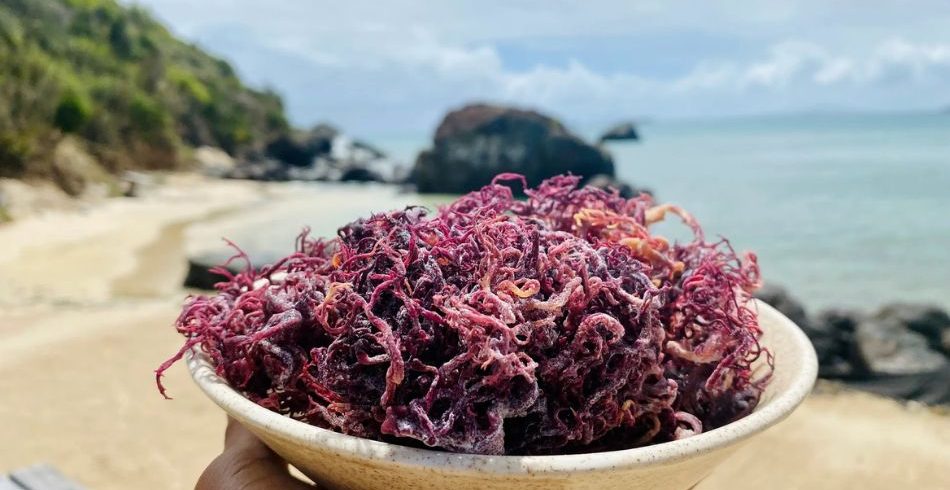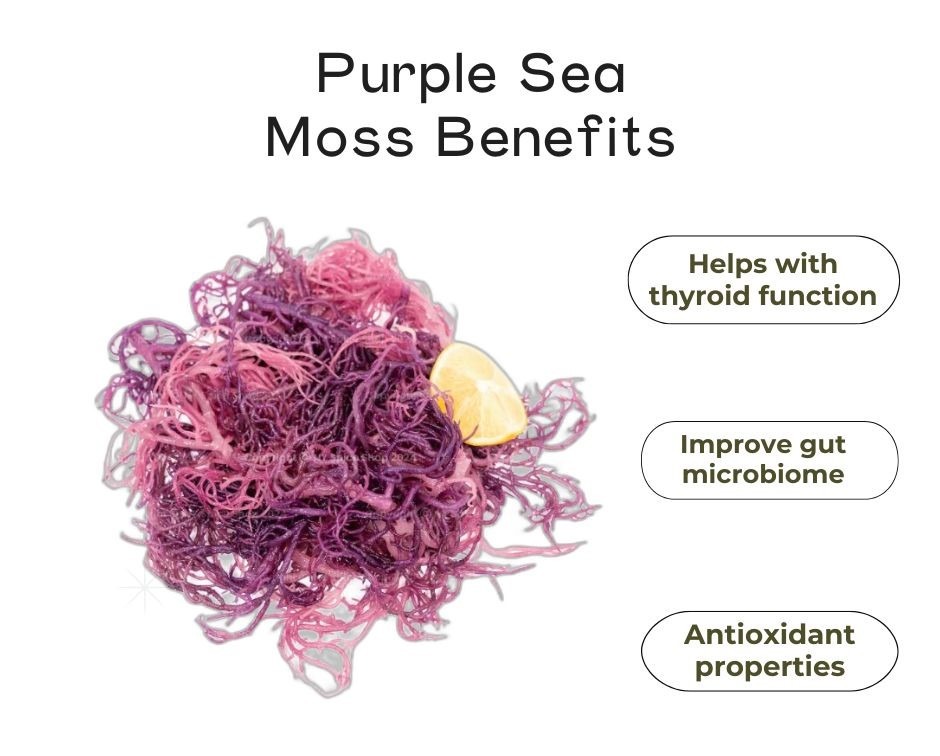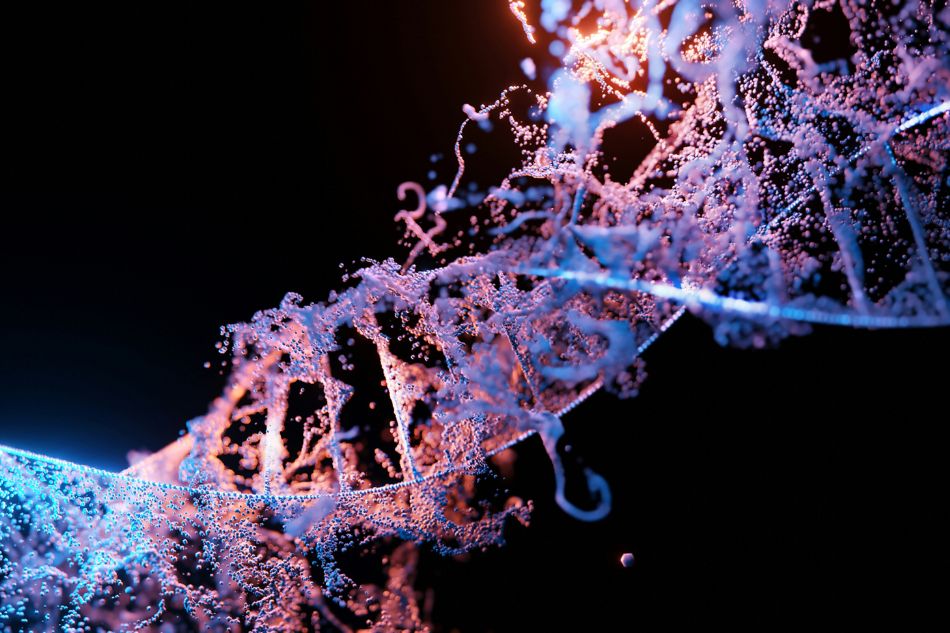
Purple sea moss, scientifically known as Chondrus crispus, is a type of red algae that’s making waves in the health and wellness world. Traditionally used in Caribbean and Irish cultures for its nutritional value and healing properties, sea moss is now gaining popularity for its wide range of potential health benefits. But what exactly makes purple sea moss special, and why are so many people adding it to their daily routines?
- Rich Nutrient Profile: Purple sea moss is packed with essential vitamins, minerals, antioxidants, and prebiotic fibers that support thyroid health, digestion, and cellular protection.
- Supports Thyroid Health: High in iodine, purple sea moss helps regulate thyroid hormone production, which is crucial for metabolism, energy levels, and overall hormonal balance.
- Improves Digestive Health: The prebiotic fibers in sea moss nourish beneficial gut bacteria, promoting a healthy microbiome, better digestion, and improved nutrient absorption.
- Powerful Antioxidant Properties: Purple sea moss contains high levels of antioxidants like flavonoids and fucoxanthin, which help reduce oxidative stress and protect against chronic diseases.
- Traditional and Modern Use: Purple sea moss has a long history in traditional medicine and is currently being studied for its health benefits, from boosting immunity to supporting skin health.
In this article, we’ll break down the science behind purple sea moss, explore its active ingredients, and highlight the health benefits it offers—from supporting the immune system and thyroid function to enhancing skin health and digestion.
Nutrient Profile: Active Ingredients in Purple Sea Moss
Purple sea moss stands out for its rich nutrient content, providing a host of vitamins, minerals, and antioxidants that are essential for maintaining good health. Let’s take a closer look at what makes it so powerful:
- Iodine: Iodine is critical for the proper functioning of the thyroid gland, which controls metabolism, energy levels, and hormone balance. Sea moss is one of the richest natural sources of iodine, making it a valuable addition for those with low iodine levels.
- Calcium, Magnesium, and Potassium: These minerals play key roles in bone health, muscle function, and maintaining a healthy heart. They’re also involved in many enzymatic reactions that keep the body’s processes running smoothly.
- Vitamins A, C, E, and K: Purple sea moss is loaded with vitamins that support skin health, boost immunity, and help protect the body from oxidative stress.
- Polysaccharides (Carrageenan): The most notable polysaccharide in sea moss is carrageenan, a natural compound known for its gel-like texture. It’s been shown to have anti-inflammatory properties and can help support digestive health by soothing the gut lining.
- Antioxidants: The deep purple color of this sea moss variety is due to its high antioxidant content. Antioxidants like flavonoids and fucoxanthin help protect cells from damage caused by free radicals, reducing the risk of chronic diseases and inflammation.
- Prebiotic Fiber: Sea moss contains fiber that acts as a prebiotic, feeding the beneficial bacteria in your gut. This helps maintain a healthy gut microbiome, which is crucial for digestion, immunity, and even mental health.
Health Benefits of Purple Sea Moss
Boosts Immune Function
Purple sea moss is packed with polysaccharides, including carrageenan, which has been shown to have antiviral and antimicrobial properties. Studies suggest that carrageenan may help the body fend off viruses like the common cold and influenza by boosting the immune system’s ability to fight off infections.
Supports Thyroid Health
One of the biggest benefits of purple sea moss is its high iodine content. The thyroid gland needs iodine to produce hormones that regulate metabolism, energy levels, and overall hormone balance. A lack of iodine can lead to hypothyroidism, which is associated with fatigue, weight gain, and a slowed metabolism.
Improves Digestive Health
Sea moss is rich in prebiotic fiber, which nourishes the beneficial bacteria in your gut. A healthy gut microbiome is vital for proper digestion, nutrient absorption, and immune function. Additionally, the gel-like consistency of carrageenan can help soothe the digestive tract, easing irritation and inflammation.
Promotes Skin Health
Purple sea moss is also known for its skin-enhancing properties. Thanks to its high levels of vitamin A and omega-3 fatty acids, sea moss can help reduce inflammation, promote hydration, and encourage skin cell regeneration. When applied topically, sea moss can soothe irritated skin, while consuming it can improve skin health from the inside out.
Supports Respiratory Health
Sea moss has long been used as a natural remedy for respiratory conditions like colds, bronchitis, and pneumonia. Its gelatinous texture helps soothe the mucous membranes in the respiratory tract, reducing irritation and easing congestion. It’s particularly helpful for relieving sore throats and coughs.
Helps with Weight Management
Thanks to its high iodine content, sea moss can also support weight management. Iodine helps regulate your metabolic rate, meaning it influences how efficiently your body burns calories. There’s also evidence that the antioxidant fucoxanthin, found in sea moss, may boost fat metabolism.

How Purple Sea Moss Supports Body Processes
Thyroid Function and Hormone Regulation
The thyroid gland plays a central role in regulating metabolism, energy production, and brain function. Iodine is a critical nutrient for the production of thyroid hormones—specifically triiodothyronine (T3) and thyroxine (T4). These hormones regulate many of the body’s essential functions, including metabolic rate, body temperature, and even cognitive health.
Purple sea moss is an excellent source of bioavailable iodine, which is necessary for synthesizing these thyroid hormones. When iodine levels are insufficient, the thyroid cannot produce enough T3 and T4, leading to hypothyroidism. Symptoms of hypothyroidism include fatigue, weight gain, dry skin, and depression. Globally, iodine deficiency remains a widespread issue, particularly in regions where iodine is not readily available in the diet.
Research consistently shows that iodine deficiency is one of the leading causes of preventable hypothyroidism. Studies demonstrate that increasing iodine intake can help restore thyroid function and normalize hormone levels. Supplementing with iodine-rich sources like purple sea moss offers a natural way to maintain healthy thyroid activity and avoid the pitfalls of underactive thyroid function.
According to a study published in the Frontiers of Endocrinology, adequate iodine intake can help prevent hypothyroidism, especially in at-risk populations like pregnant women and people living in iodine-deficient areas .
Digestive Health and Gut Microbiome
The health of your digestive system is deeply connected to the balance of bacteria in your gut microbiome. These beneficial bacteria aid in digestion, help break down nutrients, and produce vitamins like B12. The prebiotic fibers found in purple sea moss act as a food source for these beneficial bacteria, supporting a healthy microbiome and promoting better digestive health.
Once ingested, the prebiotic fibers in sea moss are fermented by gut bacteria, producing short-chain fatty acids (SCFAs) like butyrate, acetate, and propionate. These SCFAs play several important roles in the body, including strengthening the intestinal barrier, reducing inflammation, and regulating the immune response.
Gut barrier integrity is vital for preventing leaky gut syndrome, a condition where undigested food particles and toxins can pass into the bloodstream, leading to chronic inflammation and a weakened immune system. Prebiotics, like those in sea moss, can help reinforce this barrier by nourishing the beneficial bacteria that line the gut.
Studies show that prebiotics can improve the diversity and abundance of beneficial bacteria in the gut, such as Bifidobacterium and Lactobacillus. These bacteria, in turn, produce SCFAs that support intestinal health and help reduce systemic inflammation. In a study published in Frontiers in Microbiology, researchers highlighted the role of prebiotics in promoting gut health and reducing the risk of gastrointestinal disorders like irritable bowel syndrome (IBS) .
Carrageenan’s Role in Digestive Health
The carrageenan in purple sea moss has also been studied for its ability to protect the gut lining. Carrageenan forms a gel-like barrier that coats the intestinal walls, soothing inflammation and irritation. This makes purple sea moss beneficial for people dealing with digestive disorders such as gastritis or acid reflux.
Cellular Health and Antioxidant Defense
Purple sea moss is rich in antioxidants, particularly compounds like flavonoids and fucoxanthin, which help protect cells from oxidative stress. Free radicals—unstable molecules generated by environmental toxins, poor diet, or natural aging—can damage DNA, proteins, and lipids in cells, contributing to chronic diseases like cancer, heart disease, and neurodegenerative disorders.
The antioxidants in sea moss neutralize free radicals by donating electrons, effectively stabilizing these harmful molecules before they can cause cellular damage. In doing so, purple sea moss plays a key role in preventing oxidative damage that accelerates aging and increases the risk of disease.
Fucoxanthin, a carotenoid found in sea moss and other seaweeds, has been extensively studied for its antioxidant properties. Research published in Marine Drugs shows that fucoxanthin not only fights oxidative stress but also has anti-inflammatory and anticancer potential. This makes sea moss a valuable addition to any diet aimed at protecting cellular health .
Potential Side Effects, Contraindications, and Warnings
While purple sea moss is considered safe for most people when consumed in moderation, there are several factors to consider before incorporating it into your diet. Like any supplement, it’s essential to understand potential side effects, contraindications, and the appropriate dosage to ensure it’s right for you.
Potential Side Effects
- Excess Iodine Intake: Purple sea moss is a rich source of iodine, which is essential for thyroid function. However, consuming too much iodine, especially in supplement form, can lead to hyperthyroidism or exacerbate existing thyroid issues. Symptoms of excess iodine intake may include nausea, vomiting, fever, and metallic taste. It’s crucial for those with hyperthyroidism or those taking thyroid medications to consult a healthcare provider before using iodine-rich supplements like sea moss.
- Digestive Upset: Some individuals may experience digestive discomfort, including gas, bloating, or diarrhea, when they first start consuming sea moss due to its high fiber content. Starting with a small dose and gradually increasing it can help mitigate these effects.
- Carrageenan Sensitivity: Carrageenan, a compound found in sea moss, has been linked to digestive irritation in some studies. While food-grade carrageenan (found in sea moss) is generally safe, people with inflammatory bowel diseases (like Crohn’s disease or ulcerative colitis) should be cautious and monitor any digestive symptoms after consuming sea moss.
- Pregnancy and Breastfeeding: While sea moss can provide valuable nutrients like folate and iron, it’s important for pregnant and breastfeeding women to consult a healthcare provider before supplementation. Excessive iodine could interfere with fetal thyroid development.
- Medication Interactions: Sea moss may interact with medications, particularly those for thyroid conditions, blood thinners, or diuretics. The iodine content could interfere with thyroid medications, while its potassium levels could affect medications used for heart or kidney conditions.
Dosage and Forms of Supplementation
Purple sea moss is available in various forms, making it easy to incorporate into your daily routine. The recommended dosage depends on the form and individual health needs, but it’s important to start with small amounts and consult with a healthcare provider, especially if you’re using it for therapeutic purposes.
- Gel: The most popular form of sea moss is sea moss gel, made by soaking dried sea moss in water and blending it until smooth. The typical dose is 1-2 tablespoons daily. Sea moss gel can be added to smoothies, teas, or even applied topically for skin benefits.
- Powder: Sea moss powder is another versatile form, often mixed into drinks, soups, or recipes. The general dosage is 1-2 teaspoons per day.
- Capsules: Sea moss capsules are a convenient option for those who prefer supplements in pill form. Doses typically range from 500 mg to 1,000 mg per day, depending on the supplement brand and individual needs.
- Raw/Whole Sea Moss: Dried sea moss is available for those who want to prepare their own gel or use it in other recipes. The recommended starting dose for raw sea moss is 4-8 grams daily (about one small handful), depending on the individual’s health goals.
History, Location, and Traditional Uses of Purple Sea Moss
Purple sea moss has a rich history that dates back centuries. Known as Chondrus crispus, this algae is found primarily in the Atlantic waters along the coasts of Ireland, the Caribbean, and parts of North America. Traditionally, it has been used for its nutritional value and healing properties by various cultures.
Traditional Use in Ireland
In Ireland, purple sea moss is commonly referred to as Irish moss and has been harvested for hundreds of years. It gained prominence during the Irish Potato Famine of the 1800s when it became a crucial source of nutrition for the population. The Irish would boil the sea moss with milk and honey, creating a nourishing gel that helped fight malnutrition. Irish moss was also used as a remedy for respiratory issues, such as bronchitis and pneumonia, due to its mucilage properties.
Caribbean Tradition
In the Caribbean, particularly in Jamaica, sea moss has long been a dietary staple. It is commonly consumed in a beverage called “Irish Moss Drink,” made by blending sea moss with milk, spices, and sometimes rum. The drink is regarded as a tonic for energy and libido, believed to enhance sexual health and virility. Sea moss is also used in the Caribbean for its immune-boosting and digestive properties, treating everything from cold symptoms to stomach ulcers.
Conclusion
Purple sea moss is a nutrient-packed powerhouse with a wide range of health benefits. From supporting thyroid health and digestive balance to enhancing skin care and immune function, it offers both traditional and modern wellness applications. Backed by a growing body of research, purple sea moss is more than just a trend—it’s a versatile, natural supplement that can help optimize your well-being from the inside out.
If you’re looking to enhance your diet with nutrient-dense superfoods, purple sea moss is certainly worth considering. However, as with any supplement, it’s essential to consult with a healthcare provider before making significant changes to your health regimen, especially if you have pre-existing conditions or concerns about iodine intake.




